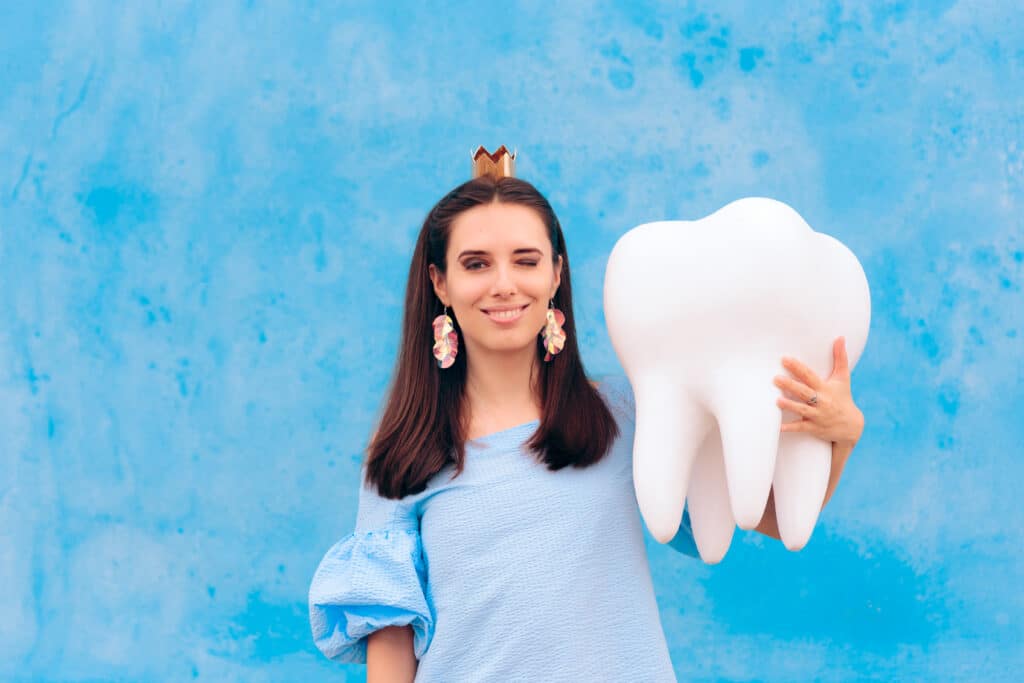

Wisdom teeth removal can sound intimidating and usually has a bad reputation. Although it can be uncomfortable for most of us, it’s a natural process we all may go through at some point in our lives.
So if you’re starting to feel that they’re coming out, just relax, get a nice cup of coffee (or some wine) and let’s learn everything there is to know about wisdom teeth removal.

Mother - General Dentist - Blogger
Wisdom teeth, or third molars, are the final set of molars that most people get in their late teens or early twenties. When they align properly and the gum tissue is healthy, wisdom teeth are not a concern. However, more often than not, they become problematic. Due to lack of space in the jaw or misalignment, they can cause pain, infection, and other dental issues.
There’s an old myth that says that wisdom teeth are a remnant from our ancestors, who needed extra chewing power. And let me tell you it’s far from being a myth, it’s actually very true. Early humans needed them due to their diet, which included raw plants and tough meats.
Back in the day, these extra molars were crucial for grinding down fibrous vegetarian diets and raw meat, but evolutionary shifts in our diets have made these teeth less necessary. Today, smaller jaws from evolved diets often don’t provide enough room for wisdom teeth. As a result, they frequently tend to become problematic and contribute to other issues such as excesive pain and even tooth loss.
We don’t live in the caverns age anymore, and nowadays taking care of your smile is more important than ever before. So If you are looking for a dental insurance plan with great coverage give us call now at (866) 664-0276 to get a free Quote!
As I explained before, today’s diets are softer and more processed, and don’t necessarily require those extra teeth. When wisdom teeth try to emerge in an already crowded mouth, it can lead to alignment issues, pain, and potential infections generally resulting in a dental emergency.
Additionally, impacted wisdom teeth, which are teeth that don’t have enough room to fully break through the gums, can cause severe dental problems such as gum disease or cavities. These issues can include cysts, damage to adjacent teeth, and more severe forms of infection. Ultimately, in these cases, removing wisdom teeth can prevent these painful and disruptive complications, ensuring a healthier and more comfortable mouth.
For most people, the procedure starts with an initial consultation with your oral surgeon. During this visit, your dentist will review your X-rays to determine the exact positioning of your wisdom teeth. Based on this evaluation, they will decide whether a simple extraction or a more complex surgical approach is necessary.
Generally, you’ll receive local anesthesia to numb the area; this means you’ll be awake but won’t feel any pain, just pressure and movement. Although sometimes, for more complicated cases, sedation is necessary.
Call us now and get a free quote. Plans starting as low as around $1/day.

The average wisdom teeth removal procedure usually takes about an hour. For a straightforward extraction, it can be much quicker. Your dentist or oral surgeon may be able to remove the teeth in less than 30 minutes if they’re fully erupted and easily accessible. However, the time can extend significantly in more complicated situations, such as when the teeth require surgical intervention.
So, your total time at the dental office can be around 2-3 hours. This includes prepping, numbing the area, performing the wisdom teeth extraction itself, and then a brief recovery period to ensure you’re responding well to the procedure.
Bear in mind that different dentists may perform extractions at varying speeds depending on their experience and the difficulty of your specific case. Always consult with your oral surgeon for a more accurate estimate on your procedure.
Let’s talk numbers; after all, it’s crucial to understand what you’re signing up for regarding the cost of wisdom teeth removal.
If you are an avid reader of our blog, for which I am truly, and highly grateful, you know that when it comes to cost there are many factors to consider, and the price can vary depending on a few reasons.
For instance, straightforward wisdom teeth extractions tend to be cheaper, ranging from $75 to $200 per tooth. Surgical extractions, especially for impacted teeth, can cost between $225 to $600 per tooth.
Remember, these costs don’t always include additional fees for X-rays, consultation, or anesthesia. So, it’s smart to ask for a detailed estimate from your dentist to avoid any surprises.
A Wisdom Teeth removal procedure can become very costly. SHD Insurance offers dental plans with great coverage for major procedures. Gives a call now at (866) 664-0276 and get a free Quote!
After your wisdom teeth removal, a bit of self-care can make a world of difference. Start with rest to let your body focus on healing. Apply ice packs on your face to reduce swelling, and follow your oral surgeon’s instructions on any prescribed medications.
Stick to soft foods like yogurt or soup initially, and avoid drinking through a straw to prevent dry sockets. Consistent oral hygiene is key, but be gentle when brushing near the extraction sites. If you experience severe pain, prolonged bleeding, or signs of infection, contact your dentist immediately.
Taking care of yourself post wisdom teeth removal is super important for a smooth recovery. First off, keep your head elevated while sleeping for the first few days. Gravity helps to reduce swelling, which is common after wisdom teeth removal.
Keeping the area clean is crucial. Rinse your mouth gently with warm salt water several times a day.
Over-the-counter pain medication, like ibuprofen, can help manage pain and reduce inflammation resulting from wisdom teeth removal. Follow the dosage instructions to avoid complications.
Regular check-ups with your dentist after the wisdom teeth extraction(s) can ensure everything is healing as it should.
Lastly make sure to follow the instructions below:
Rest: Prioritize ample rest; avoid strenuous activities for at least 24-48 hours.
After wisdom teeth removal, sticking to a soft food diet is crucial to avoid irritating the extraction sites.
Keep the food lukewarm to avoid causing additional irritation or discomfort after the wisdom teeth removal procedure. Also, avoid crunchy, spicy, and hot foods that could disrupt the healing process.
Wisdom teeth removal, while routine, is a significant procedure requiring proper care. Following the right steps ensures successful recovery. By focusing on gentle oral hygiene and avoiding harmful habits like smoking, you can heal well.
It’s essential to stay in touch with your dentist, ensuring everything is on track. With some patience and mindful care, you’ll be back to your normal self in no time. Remember, your oral health journey doesn’t stop at wisdom teeth removal; regular check-ups and good habits pave the way to a healthy smile.
If you are struggling to find a good dental plan that you can rely on when needed; SHD offers great options for individuals, families and seniors. Call us now at (866) 664-0276 to get a free Quote!
By clicking the “Get a Quote Now” button above, I expressly authorize SHD, Smart Health Dental, LLC along with their agents and affiliates, to call me or send me recorded messages or texts about their Dental Insurance Plans, products and services using automated technology to the telephone/cellular number I entered immediately above, which I certify is my own number. I understand that I am not required to consent in order to make a purchase.
Plans powered by Renaissance Dental
Copyright by Smart Health Dental, LLC. All rights reserved. 2023.
Smart Health Dental is a national dental plan that is dedicated to providing you with the best service in the industry. We are committed to developing quality dental products that provide consumers with the best value and choices in the insurance industry.
The Smart Health Dental PPO insurance policy is underwritten by Renaissance Life & Health Insurance Company of America, Indianapolis, IN, and in New York by Renaissance Life & Health Insurance Company of New York, Binghamton, NY. Products and services referred to may not be available in all states and jurisdictions. There is no ownership affiliation between Renaissance and Smart Health Dental. For complete coverage details, please refer to the certificate of insurance.
Membership in Communicating for America, Inc. (CA) is required to enroll for coverage under the Smart Health Dental PPO insurance policy offered. CA membership provides non-insurance discounts like prescription drug discounts and a vision discount program. CA will communicate member information to you via email or by directing you to their website. Should an individual decide to enroll in the dental insurance policy, he or she will be prompted during the enrollment process to confirm acceptance of membership in CA.
*Certain restrictions apply; please call or email us for full details.
1Renaissance Partner Network Data 2016
DMPO DISCLOSURE:
This plan is a discount plan NOT a health insurance policy.
This plan provides discounts at certain health care providers for medical services.
This plan does not make payments directly to the providers of medical services.
The plan member is obligated to pay for all health care services but will receive a discount from those health care providers who have contracted with the discount medical plan organization.
The DMPO does make available an up-to-date list of all program providers which includes their name, city & state, and medical specialty prior to purchase, upon request.
That the range of discounts for medical services provided under the plan will vary depending on the type of provider and the medical services received.
The corporate name and the location of the licensed discount medical plan organization is: Access One Consumer Health, Inc. 84 Villa Road, Greenville, SC 29615; 1-800-896-1962; www.accessonedmpo.com
This plan is not available in AK, AR, MT, RI, UT, VT or WA.
Looking for a Dental Plan?
We offer insurance and non-insurance plan options designed to fit your needs and budget